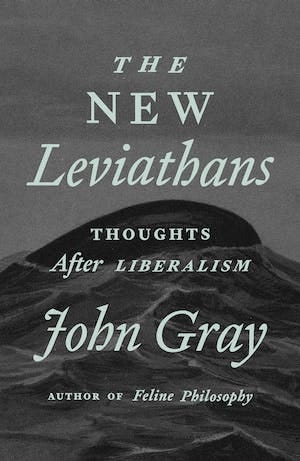Good morning! It’s Wednesday, and here are this week’s five items for you.
In this post, paid subscribers will receive:
the rest of the first item
bad headlines
a video curriculum I helped make for church small groups!
some recent work
“beef” vs. “cow”
If you’re not already a paid subscriber, please consider upgrading to read the whole post—and to support my work:
1. A take I haven’t written elsewhere
Liberalism is the best thing going

I’m reading this book, The New Leviathans (forthcoming from philosopher John Gray on Nov. 7), to review for Christianity Today, and it’s good. Not a linear, rigorous argument, but very pleasantly written, gloriously succinct (161 pages, though that cover art suggests an easy 400), and accessible without ever feeling dumbed down. I’m not at the end yet, and I’ll say more in the review, but for now, I recommend it.
You’ll see the subtitle is Thoughts after Liberalism, and that’s the immediate origin of this post, though it’s something I’ve often considered writing before. He means, of course, liberalism in the classical sense, not the contemporary progressive agenda but older commitments to free speech, due process, rule of law, individual equality, the marketplace of ideas, and so on.
Here is how the book begins (I’m not letting any cat out of the bag here; you can already see this bit in the Amazon preview):
Twenty-first-century states are becoming Leviathans, spawn of the biblical sea-monster mentioned in the Book of Job, which the seventeenth-century English philosopher Thomas Hobbes used to picture the sovereign power that alone could bring peace to unruly humankind. Only by submitting to unlimited government could they escape the state of nature, a war of all against all in which no one is safe from their fellows.
As he portrayed it in his masterpiece Leviathan, a state of nature was not in the distant past before the emergence of society but the breakdown of society into anarchy, which could happen at any time. It did not matter whether the sovereign was a king or a president, a parliament or a tyrant. Only a state whose power was unfettered could secure a condition of ‘commodious living’ in which industry, science and the arts could flourish in peace.
In the centuries that followed, it seemed Hobbes was mistaken. States emerged in which power was limited by law.
Democracies developed in which governments could be held to account. In the twentieth century, the defeat of Nazism and communism seemed to show that liberal government was inherently more effective than dictatorship. After the end of the Cold War, many believed liberal democracy was becoming universal.
Today, states have cast off many of the restraints of the liberal era. From being an institution that claimed to extend freedom, the state is becoming one that protects human beings from danger. Instead of a safeguard against tyranny, it offers shelter from chaos.
Keep reading with a 7-day free trial
Subscribe to Bonnie Kristian to keep reading this post and get 7 days of free access to the full post archives.




